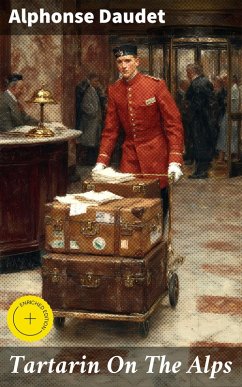In "Tartarin on the Alps," Alphonse Daudet masterfully combines satire and adventure to continue the story of the bumbling yet lovable hero Tartarin, first introduced in his earlier work, "Tartarin of Tarascon." Set against the majestic backdrop of the Alps, Daudet employs vivid and humorous prose to explore themes of ambition, illusion, and the human propensity to fabricate grand narratives about oneself. The novel is steeped in the literary context of 19th-century French realism while also poking fun at the romanticized notions of mountaineering and heroism that were prevalent during that era, creating a delightful contrast between expectation and reality. Daudet, a prominent figure in French literature, drew inspiration from his own experiences in the picturesque Alps and the cultural zeitgeist of his time. An ardent observer of human folly and societal norms, his works often exhibit a blend of humor and melancholy. The journey of Tartarin resonates with Daudet's penchant for examining the complexities of identity and the nature of personal ambition, reflecting his own struggles in a rapidly changing France. "Tartarin on the Alps" is a humorous and insightful exploration that invites readers to reflect on their own aspirations and the often absurd nature of human endeavors. Whether a seasoned reader of literature or a newcomer to Daudet'Äôs works, this novel promises a captivating experience filled with wit and charm, making it a must-read for anyone intrigued by the interplay of comedy and human ambition.
Dieser Download kann aus rechtlichen Gründen nur mit Rechnungsadresse in A, B, BG, CY, CZ, D, DK, EW, E, FIN, F, GR, H, IRL, I, LT, L, LR, M, NL, PL, P, R, S, SLO, SK ausgeliefert werden.









